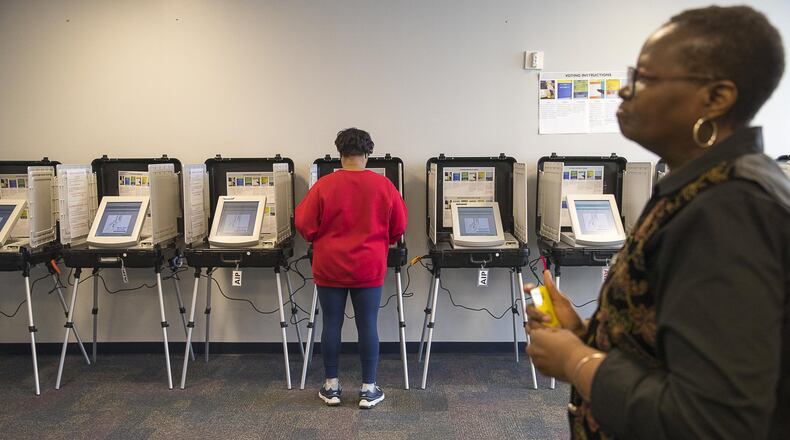When Georgia legislators approved new voting machines last week, they also rewrote election laws dealing with voter registration cancellations, recounts and precinct closures.
The sweeping election bill, which is awaiting Gov. Brian Kemp's signature, attempts to address some of the problems seen in November's high-turnout election for governor, including allegations that voters were denied access, absentee ballots were rejected and vote counts were incomplete.
Here's a look at the changes ahead for Georgia elections as a result of the passage of House Bill 316:
Voting machines
The new election system would be familiar to Georgia voters accustomed to using touchscreens. That part of the voting process would remain the same, but the new touchscreens would be attached to printers that generate paper ballots. Georgia's current electronic voting machines lack a paper ballot.
Voters would be able to review their choices on their paper ballots, then insert them into optical scanning machines for tabulation. The paper ballots would be stored for recounts and audits.
Audits of paper ballots would check typewritten votes against computer counts starting with the November 2020 general election. If audits find irregularities, results could change before elections are certified. The printed paper ballot would be the official ballot to be used in audits and recounts.
Details of the audits aren’t spelled out in HB 316, which would direct the State Election Board to create audit requirements.
While supporters of the legislation say audits will ensure accurate elections, skeptics say the printed ballots can't truly be validated because voters won't necessarily review them or catch errors. The bill calls for signs posted in each precinct reminding voters to verify their choices before casting their ballots.
Registration cancellations
Lawmakers voted to curtail the state government's practice of canceling voters' registrations if they don't participate in elections for several years.
Currently, voter registrations can be canceled after six or seven years if those voters fail to have any contact with election officials or cast a ballot. First, voters are declared inactive after three years, then their registrations can be canceled if they fail to vote in either of the next two general elections.
Under HB 316, voter registrations wouldn’t be canceled for inactivity for eight or nine years, which is two years longer than under existing state law. The bill would change the time before a voter becomes inactive from three to five years.
More than 1.4 million voter registrations were canceled in Georgia from 2010 to 2018.
In addition, voters would be mailed a notification between 30 and 60 days before their registrations are canceled.
The legislation also would curtail Georgia's "exact match" law, which put more than 50,000 registration applications on hold last year because of discrepancies between government records. Those voters were stalled for several reasons, including hyphenated last names, questions about citizenship status, and differences between maiden names and married names. They could become active voters if they showed photo ID that proved their eligibility.
The “exact match” law would change so that applicants immediately become active voters when they sign up to vote, but their names would still be flagged if there are inconsistencies in voting records. Like all Georgia voters on Election Day, they would need to show official photo ID for verification before they could cast a ballot.
A separate part of the bill calls for Georgia to join a multistate organization to track voters who move out of state or die. Those voters' registrations could then be canceled.
Polling places
Changes to precincts, including relocations and closures, couldn’t be made in the 60 days before a general or primary election, according to HB 316.
That provision comes after an outcry in August over a proposal to close seven out of nine precincts in Randolph County. County officials have closed 214 precincts across Georgia since 2012, according to an analysis by The Atlanta Journal-Constitution last year.
The legislation also would reduce the number of voting machines per registered voter. The bill calls for one machine for every 250 voters; existing law requires one voting machine for every 200 voters.
While opponents of this idea say it will lead to longer waits and discourage voters, supporters say they don't think lines will grow. That's because each of the new touchscreens would be available on Election Day as well as during early voting. Currently, voting machines used during early voting can't be reused on Election Day because they electronically store votes. The state's incoming touchscreens would print ballots but not save votes.
Recounts and absentees
Absentee ballots shouldn’t be rejected because of mismatches between voters’ signatures on their ballots and their signatures on file, according to the bill. Those voters would be mailed a request for identification so that their absentee ballots would counted.
An analysis by the AJC found that county election officials reported rejecting nearly 7,000 ballots, or 3 percent of total absentee votes cast, in November's election.
The legislation also would lower the threshold for a losing candidate to request an automatic recount to 0.5 percent. Currently, losing candidates are entitled to a recount if they lose by 1 percentage point or less.
Stay on top of what’s happening in Georgia government and politics at ajc.com/news/georgia-government/.
About the Author
Keep Reading
The Latest
Featured




